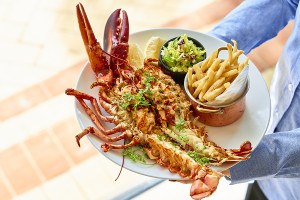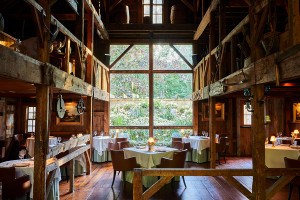Dining Out: House Blend
It's nice to see a hard-working chef get what he always wanted. In the case of Meritage, at the Boston Harbor Hotel, it's also nice to taste the results.
Daniel Bruce made a name for himself in the late 1980s with his cosmopolitan, glossy nouvelle cuisine, making the very plush, very large dining room of this hotel the city's first serious rival to the Four Seasons' updated, unstuffy luxury. Bruce became a great favorite of Julia Child for his expert technique—the very top attribute on Child's list. He distinguished himself nationally by pioneering the Boston Wine Festival, which brings a steady stream of winemakers to town in the dullest days of winter. Both the festival and Bruce would become Boston landmarks.
But by the late '90s, the flagship hotel restaurant had lost its luster. The wine list was superb and long, of course, but the dishes clung to a French-Italian version of nouvelle cuisine that had become outmoded in the fresh Mediterranean craze. More important, Bruce himself seemed bored—at least so far as his kitchen's inconsistency suggested.
A year and a half ago, Bruce reinvented the restaurant and moved it from its overly large setting to a smaller space with a stunning view of the harbor. The reconceived menu had many of the same motives as the festival: to show off the wines of the world and how interestingly they can be paired with food.
His playground-laboratory, called Meritage after the California blend, is more fun and far more consistent than the previous restaurant. There's handsome wood in place of the rich carpets and upholstery, which can make for too much noise at peak dining periods, but gives a casually elegant feel to the long rectangular room. Eating at Meritage is like enjoying a pleasurable puzzle, and solving it is an often rewarding pursuit.
Here's how the game works: The main menu is divided into six sections that correspond to styles of wine, with four dishes in each section. This assumes a familiarity with the weights and styles of wine, which isn't so very hard. Most everyone can fairly easily call to taste memory the categories: sparklers, light whites, full-bodied whites, fruity reds, spicy, earthy reds, and robust reds. On the early spring menu, each of the dishes under fruity reds had some form of fruit in it: black-currant glazed salmon, syrah elderberry essence with foie gras and quail confit, pinot lingonberry sauce with duck breast, cherry merlot demi-glace with mint-glazed Sonoma squab.
If the food sounds fussy, some of it is. Bruce hasn't shaken off the complexity-is-better ethos of his early training, even as most of the rest of the culinary world has moved toward simplicity. I myself prefer a food-to-wine-matching strategy that doesn't mandate wines in the sauces or glazes, something the pioneering New York City restaurant Veritas made popular a few years ago. Thinking hard about which flavors in food that wine can both echo and complement is a more rewarding approach, I think, and roughly a quarter of the dishes on the Meritage menu do that. They are by no means all successful—many mix too many flavors, and it's virtually impossible to sort them out. Yet I was pleasantly surprised by the overall level of execution, which was impressively high. A few dishes even stood out in memory, though most seemed mainly pleasant foils to good wine.
Here I should say that the wine list at Meritage is fascinating and tempting, with wines from all the major regions at fair (though not bargain) prices. If you've read of a boutique vineyard or a suddenly fashionable grape, it's here. I didn't have the sense that everyone on the service staff was quite as versed in the list as my guests, but, to be fair, I invited wine nuts who couldn't wait to have a crack at the distinguished Meritage list.
I'll confess to taking the easy route, which I recommend: Pick the style of wine you like and order dishes within it. Ordering from one category makes it easy to share dishes and luxuriate in one great bottle that will go with everything rather than having to order many wines by the glass. Every dish is available in both small and large plates. The small plates, at $15 each, are like generous appetizers and easily allow two big bites each for four diners; the large plates, at $29, are really large. This sympathetic approach allows ambitious diners to enjoy three flights, organized around, say, sparklers and a white and a red, without breaking the bank (just knocking at its door).
Can it be coincidence that the most appealing and straightforward dishes were under the wine styles I prefer—full-bodied whites and robust reds? The simplest dishes impressed me the most: an appetizer paired with sparklers was fennel-cured smoked salmon, soft and unctuous and gently flavored, with not-too-sweet warm corn custard that was a creamy timbale. The richness almost demanded the acidity of the dry-side Conegliano-Valdobbiadene Prosecco we ordered. The wood-grilled Atlantic halibut was a beautiful piece of fish, snowy and fresh as halibut should always be, with mild-flavored quinoa (one of my favorite grains for its sweet and nutty flavor and caviar-pop texture) and a sauce that both set off and deepened the flavors with lightly caramelized onions. The medium- to full-bodied Piedmontese Arneis did seem to balance that sauce and the very weight of the dish. However, the black truffle-laced roast Vermont pheasant with a porcini-mushroom-and-leek ragout, which was also listed in the full-bodied white category, seemed a bit heavy and more suited to a medium red. Admittedly, this is everybody's-a-chef territory; but, too, the flavor of the meat was slightly muddy, as game birds can be.
The desserts (each $11), unfortunately, seemed to encapsulate the too-fussy part of the menu concept, with several bites of overly fancy cream cakes and minitarts with crusts on the soggy side. Better to end with a selection of artisanal cheeses ($12), some of the fresh Hi-Rise bread, and just one more rich red or deeply flavored port. Meritage is a restaurant designed to make you savor wine, and in that noble goal, Bruce has richly succeeded.


